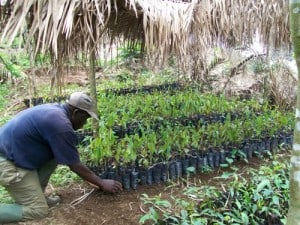
The decision to donate these trees stems from the fact that the Bakassa Community has shown a lot of interest in this plant. The people explained that they want to plant the trees around their water catchment so as to maintain and sustainably manage the flow of water in the community. They have equally expressed their interest in the bark of the tree for its medicinal purpose. The community will receive the seedlings this July 2013. Over 15 farmers groups already practicing agroforestry for soil health improvement will benefit from this medicinal tree.
The community received this news with a lot of joy. According to one of the farmers Jean Baptist, planting Prunus africana, a plant whose bark is known for its huge medicinal value would help improve on the health of the Bakassa people.
Just to note that Prunus has for long suffered from excess exploitation for commercial and medicinal purposes without replacement. This caused the plant to almost go extinct in Cameroon. Given this situation, the government of Cameroon put a ban on the exploitation and exportation of Prunus africana. It was only then that people began to recognize the importance of this plant.
As a result of the scarcity of Prunus, some developmental NGOs decided to regenerate this plant and fight its local extinction. It was against this backdrop that the Trees for the Future Cameroon Program trained communities, farmer groups and individuals on grafting pigeom. Pigeom can be found around SW Cameroon, in the West and North West Regions of Cameroon.
By Payong T. Marquise



